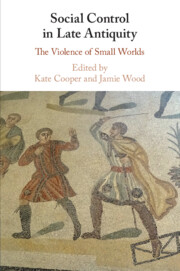Book contents
- Social Control in Late Antiquity
- Social Control in Late Antiquity
- Copyright page
- Contents
- Contributors
- Preface and Acknowledgements
- Abbreviations
- Introduction
- Part I Women and Children First
- Part II ‘Slaves, be subject to your masters’
- Part III Knowledge, Power, and Symbolic Violence
- Part IV Vulnerability and Power
- Bibliography
- Index
Part II - ‘Slaves, be subject to your masters’
Discipline and Moral Autonomy in a Slave Society
Published online by Cambridge University Press: 18 September 2020
- Social Control in Late Antiquity
- Social Control in Late Antiquity
- Copyright page
- Contents
- Contributors
- Preface and Acknowledgements
- Abbreviations
- Introduction
- Part I Women and Children First
- Part II ‘Slaves, be subject to your masters’
- Part III Knowledge, Power, and Symbolic Violence
- Part IV Vulnerability and Power
- Bibliography
- Index
Summary
Part II considers how Christian authors addressed the issue of slavery. In the late Roman world, slavery functioned as a fundamental socio-economic framework around which contemporaries organised their lives, conceptually and practically.1 Just as Jonathan Tallon’s chapter in Part I shows how slavery within the household found acceptance, albeit sometimes grudgingly, in the writings of John Chrysostom, so the following chapters demonstrate how slavery was woven into the fabric of Christian society in later antiquity. Christian writers and preachers used metaphors of slavery in order to communicate with their audiences, while slaves were ever-present, if not always recorded, in Christian communities.
- Type
- Chapter
- Information
- Social Control in Late AntiquityThe Violence of Small Worlds, pp. 103 - 170Publisher: Cambridge University PressPrint publication year: 2020

